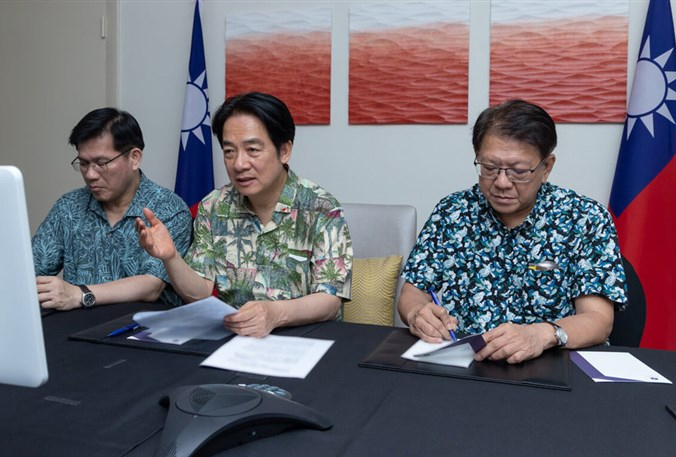In light of the recent political turmoil in South Korea, President Lai Ching-te (賴清德), who is currently on his first official overseas trip since taking office, convened a high-level national security meeting via video conference on Wednesday night. The meeting followed a dramatic political event in South Korea where President Yoon Suk Yeol attempted to declare martial law, an announcement that sent shockwaves throughout the region.
Taiwan’s National Security Response to South Korea’s Crisis
President Lai, who is in Guam for a brief stopover during his Pacific tour, acted swiftly to ensure Taiwan’s national security team was prepared to respond to any potential regional instability. During the 40-minute video conference, Lai emphasized the importance of maintaining continuous communication with Taiwan’s democratic allies. He instructed his security team to closely monitor the developments in South Korea and assess their implications for regional security, geopolitics, and the economy.
The meeting came just a day after South Korean President Yoon’s unexpected announcement of emergency martial law, which was quickly reversed following a unanimous vote in the South Korean Parliament. The move has led to significant political fallout, with calls for President Yoon’s impeachment mounting. Lai’s urgent response underscores Taiwan’s commitment to safeguarding its security and diplomatic interests amid rising tensions in East Asia.
Ongoing National Security Monitoring
During the video conference, President Lai directed Taiwan’s national security officials to remain vigilant regarding potential military activities, particularly from China, and to keep him updated on developments while he continues his diplomatic trip across the Pacific region. Security sources have suggested that China might use Lai’s overseas travel as a pretext to launch new military drills near Taiwan, further complicating an already tense geopolitical environment.
Lai’s trip, which began on November 30, aims to strengthen Taiwan’s diplomatic ties with its Pacific allies, including the Marshall Islands, Tuvalu, and Palau. The president is accompanied by senior officials, including Secretary-General of the National Security Council Joseph Wu (吳釗燮) and Defense Minister Wellington Koo (顧立雄), among others. The trip includes stopovers in Hawaii and Guam, with Lai scheduled to return to Taiwan on Friday evening.
Taiwan’s Vigilance in the Face of Regional Instability
The situation in South Korea is being watched closely in Taiwan, as the potential for increased instability in the region could have far-reaching consequences. As tensions rise between Taiwan and China, especially regarding issues of sovereignty and military threats, Taiwan’s national security team is on high alert. The swift response to the crisis in South Korea highlights Taiwan’s proactive approach to international security challenges.
Table: Key Participants in President Lai’s National Security Video Conference
| Official | Position | Role in the Meeting |
|---|---|---|
| Lai Ching-te | President of Taiwan | Chaired the video conference |
| Joseph Wu (吳釗燮) | Secretary-General, National Security Council | Provided national security briefings |
| Wellington Koo (顧立雄) | Minister of National Defense | Discussed military implications |
| Tsai Ming-yen (蔡明彥) | Director-General, National Security Bureau | Reported on cross-strait and regional security |
FAQs about President Lai’s National Security Meeting
1. Why did President Lai hold a national security meeting while abroad?
President Lai called the meeting in response to a political crisis in South Korea, where President Yoon Suk Yeol attempted to impose martial law. The meeting was convened to assess the potential risks this could pose to regional security.
2. What was the outcome of the martial law declaration in South Korea?
President Yoon’s emergency martial law announcement was quickly rescinded after the South Korean Parliament voted against it. This political crisis has led to calls for President Yoon’s impeachment.
3. How is Taiwan preparing for possible military action from China?
President Lai has directed Taiwan’s national security team to monitor potential military activities in the region, particularly from China, which might use Lai’s overseas trip as a pretext for new drills near Taiwan.
4. What is the focus of President Lai’s current overseas trip?
President Lai’s trip focuses on strengthening diplomatic relations with Taiwan’s allies in the Pacific region, including the Marshall Islands, Tuvalu, and Palau.
5. How will this situation affect Taiwan’s security policies?
Taiwan is taking a proactive approach to regional security by ensuring constant communication with democratic partners and preparing for any potential geopolitical shifts or economic impacts caused by instability in the region.
